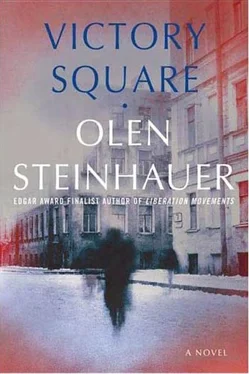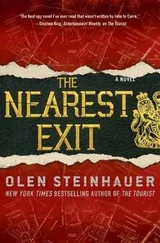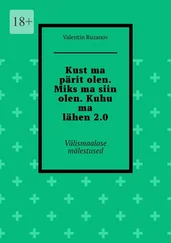Olen Steinhauer - Victory Square
Здесь есть возможность читать онлайн «Olen Steinhauer - Victory Square» весь текст электронной книги совершенно бесплатно (целиком полную версию без сокращений). В некоторых случаях можно слушать аудио, скачать через торрент в формате fb2 и присутствует краткое содержание. Жанр: Политический детектив, на английском языке. Описание произведения, (предисловие) а так же отзывы посетителей доступны на портале библиотеки ЛибКат.
- Название:Victory Square
- Автор:
- Жанр:
- Год:неизвестен
- ISBN:нет данных
- Рейтинг книги:3 / 5. Голосов: 1
-
Избранное:Добавить в избранное
- Отзывы:
-
Ваша оценка:
- 60
- 1
- 2
- 3
- 4
- 5
Victory Square: краткое содержание, описание и аннотация
Предлагаем к чтению аннотацию, описание, краткое содержание или предисловие (зависит от того, что написал сам автор книги «Victory Square»). Если вы не нашли необходимую информацию о книге — напишите в комментариях, мы постараемся отыскать её.
Victory Square — читать онлайн бесплатно полную книгу (весь текст) целиком
Ниже представлен текст книги, разбитый по страницам. Система сохранения места последней прочитанной страницы, позволяет с удобством читать онлайн бесплатно книгу «Victory Square», без необходимости каждый раз заново искать на чём Вы остановились. Поставьте закладку, и сможете в любой момент перейти на страницу, на которой закончили чтение.
Интервал:
Закладка:
Shevchenko’s expression, at first confused, shifted. It was in the edges of his nose and the way his heavy eyes seemed to stretch just slightly. Fear, or repugnance. “How did you find me?”
“I’m not here to bother you.”
“You are.”
“No.”
“Then why are you here?”
“To talk. Please come out and close the door.”
Shevchenko looked back into the classroom and said in English, “I’ll be right back. Everyone, quiet.” Then he stepped into the corridor and shut the door. Something occurred to him, and he raised a finger. “Tell them you can’t find me. Tell them I died.”
“Tell who?”
Shevchenko said nothing at first. Then: “What do you want to talk about?”
That was the question for which Gavra had no real answer. So he said, “These kids are in trouble?”
Shevchenko frowned; he nodded.
“American kids, are they any worse than we were?”
“Much, much worse. But you didn’t cross the Atlantic to ask me that.” Behind his glasses, a dew of sweat formed in Shevchenko’s thick eyebrow and rolled down his cheek. “You’re going to kill me, aren’t you.”
“I’m not going to kill you. I just want to talk.”
“You’re a liar.”
“Come on,” said Gavra. “We’re going.”
“I have a job here.”
“They can take care of themselves.”
Shevchenko shook his head and tried to speak with conviction. “I’m not going anywhere with you.”
Gavra looked past the math teacher, down the empty corridor, then behind himself. Control. He had to keep in control. This was something that, more than a decade before, Brano had hammered again and again to into his pupil. Stay in control. Act, but never react. Once you start reacting, you’ve already lost.
He took the P-83 from his pocket and shoved it into Lubov Shevchenko’s stomach, whispering, “Please don’t make me shoot you, comrade. I just want to talk. Walk with me.”
“Comrade.” Shevchenko shook his head, but the fear was evident. “Never thought I’d hear that word again.”
Gavra moved the pistol to the small of Shevchenko’s back and gripped the man’s elbow as they walked ahead, then turned left. Just before the exit stood the heavyset clerk he’d spoken to a couple hours before. She smiled brightly. “So you found him!” She winked at Shevchenko. “Lubov, your cousin wanted it to be a surprise!”
Gavra dug the barrel into Shevchenko’s back, forcing a smile into the teacher’s face. “Yes…”
“My cousin is always flustered by surprises,” Gavra told the woman as they passed. “The bad girl, Jennifer-she was right!”
“Tell me about it,” the clerk said, laughing as she disappeared around the next corner.
On the turnpike, Lubov Shevchenko began to weep. There was nothing gradual about it. One moment a frightened calm held him mute; the next, he covered his face with his hands and moaned, rocking back and forth. It was an unnerving sound.
“Cut that out,” said Gavra, accelerating.
Lubov wouldn’t stop. When he tried to speak, the tears flowed, glistening in the late afternoon sun; he coughed wetly.
“I told you, I’m not here to kill you.”
“I don’t care what you say,” Lubov managed. “You wouldn’t tell me, would you?”
“You live alone?”
The math teacher nodded.
“Where?”
“What?”
“We’re going to your house.”
Lubov, between fits, pointed him around a U-turn and then through a secluded side entrance to the woods of Brandermill. They looped around a flat-faced medical center, then took a left onto a tree-shaded street lined with the kinds of houses one saw in Hollywood films. Thornridge Lane. Each house had a paved driveway leading from the road, and along the curb five-digit numbers had been stenciled in green.
“What’s your number?”
“What?”
“House number!”
“Three five two-oh-six.”
The house was barely visible through its wooded front yard. Gavra turned down the steep driveway and stopped in front of a bark-colored bi-level.
“Teaching pays well?” said Gavra.
“In Brandermill, this is part of the slums.”
“Let’s not start our relationship with lies.”
The math teacher swallowed. “It’s the truth.”
Gavra opened the car door for him, the pistol always in sight, and took him to the front door, where Lubov fumbled with keys.
Holding him by the elbow, Gavra walked through the house, trying to hide his amazement. From the landing they went upstairs into a high-ceilinged living room that opened onto a terrace with a view of the pine forest Lubov humbly called a backyard. The kitchen, too, was large, the tall, full refrigerator humming. A master bedroom, sparsely furnished, was four times the size of the bedroom Gavra shared with his roommate, Karel, and a smaller bedroom had been converted into an office.
They returned to the landing and continued to the half-underground lower floor, with two more bedrooms, a long den, and an empty utility room with a door leading into the jungle of backyard.
Convinced of their solitude, Gavra placed Lubov on the den sofa across from a massive television. “Don’t tell me you live alone in this place.”
He shrugged, the fear apparently waning. “It’s what they gave me.”
“Who?”
Lubov stiffened, then mumbled something.
“What?”
“I said, you know who gave it to me.”
“Pretend I don’t.”
This seemed to confuse the man. He opened his mouth, closed it, then said, “Who are you?”
Gavra showed him the pistol again. “Right now, you talk. Afterward, I’ll speak. Okay?”
“The Americans,” said Lubov. “CIA.”
“They gave you this house?”
“And the name.”
“Why?”
“It was part of the deal. I answer their questions; they give me a new life. How did you find me?”
“From the beginning,” said Gavra, pulling up a chair. “Your real name.”
“Lebed Putonski.”
“That’s a good start. Where did you make the deal with the Americans?
“Stockholm.”
“Why were you in Stockholm?”
“You really don’t know, do you?”
“I want your version of the story. Why were you in Stockholm?”
Lebed Putonski pressed his fingertips together, as if praying. “This was almost a decade ago. I was there to oversee things.”
“You were the Stockholm resident?”
Putonski shrugged. “Of course. There’s a reason the Ministry keeps watch on its own residents. We start to enjoy life. We start thinking maybe we’d have a better time somewhere else. And then we do.”
“Why not just stay in Stockholm?”
“I was recalled. I guess the Ministry wasn’t happy with my work, or maybe they suspected what I was thinking. Fair enough.” He shrugged again. “I was a desk man, been one all my life. Can’t say I really understood half of what I was doing. So…” He squinted at the pistol. “So I contacted the Americans, spent some weeks at Lang-ley, and then I moved here. Now, eight years later, you’re pointing a gun at me. Why?”
Gavra didn’t understand it either. This was just another old man who’d gotten tired of the intrigues and breadlines. He wasn’t an ideological turncoat, and the information he, after prodding, admitted to giving the Americans was hardly explosive: the Central Committee’s position on its fraternal relations with Sweden, in-country troop sizes and distribution, and some real gross domestic product numbers. All Putonski had wanted was an easier life, and here he’d gotten it.
The telephone rang.
“You expecting someone?”
Putonski shook his head. “Maybe it’s my girlfriend.”
“Girlfriend?”
“Maureen.” He paused. “Everyone gets lonely.”
Читать дальшеИнтервал:
Закладка:
Похожие книги на «Victory Square»
Представляем Вашему вниманию похожие книги на «Victory Square» списком для выбора. Мы отобрали схожую по названию и смыслу литературу в надежде предоставить читателям больше вариантов отыскать новые, интересные, ещё непрочитанные произведения.
Обсуждение, отзывы о книге «Victory Square» и просто собственные мнения читателей. Оставьте ваши комментарии, напишите, что Вы думаете о произведении, его смысле или главных героях. Укажите что конкретно понравилось, а что нет, и почему Вы так считаете.












